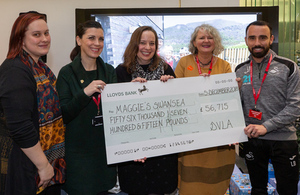Mr President, Excellencies, Distinguished Delegates.
It is a great privilege to address this Assembly on behalf of the Government of the United Kingdom.
We are grateful to His Excellency President O-Gon Kwon for leading the work of the Assembly, and to the Court’s principals – the President, Registrar, and the Prosecutor – for steering the Court through this landmark year of the twentieth anniversary of the Rome Statute.
While we remember the historic origins of the ICC, and the atrocities that preceded it, there has never been a more important time to reflect on the Court and its work. The United Kingdom over the last 20 years has been, and continues to be, a supporter of the Court. We are not just a supporter with words, but also practical assistance. We are one of the highest contributors to the Budget and to the Trust Fund for Victims, to which we have donated over 4 million Euros since its inception. We have also donated to the Trust Fund for Family Visits and we continue to provide practical cooperation and assistance to the Court, including in active Investigations and Preliminary Examinations.
We do these things to strengthen the Court in the execution of its mandate agreed in Rome, twenty years ago. We believe in the vital importance of the rule of law and of accountability for gross violations of human rights and the laws of war. That will always be our position. The United Kingdom is determined to see the perpetrators of atrocities brought to justice; it is vital for lasting peace. That is why we are playing a leading role supporting justice and accountability efforts in Syria, Iraq, and Burma.
But as a State that supports the Court, it is important that we also speak plainly about the concerns we have. A founding principle of the Court is complementarity. The Court is not there to second guess, still less to review, the decisions of competent, functioning national systems of justice. Justice should in principle be done at the state level. The Court should step in only where States are genuinely unable or unwilling to do so themselves. We believe the Court must reaffirm and apply the principle of complementarity in all it does.
And similarly, the Court has no mandate, and no jurisdiction, nor will it ever have nearly enough capacity, to act as a human rights monitoring organisation for the whole world. It must focus on its core and essential task, set out under the Statute.
If it acts otherwise, it risks eroding the confidence States have in the Court and the integrity of the system. It adds to the Court’s ever-growing backlog of cases. And it increases the length of time taken for Investigations and Preliminary Examinations – some of which are as old as the Court itself. This situation is not sustainable. The Court must urgently adopt a closure strategy for its cases, including timelines and targets for preliminary examinations, investigations and trials. We strongly encourage the continuation, and expansion, of the Performance Indicators project, an essential management and governance tool.
Mr President,
Moreover it surely goes without saying that the Court must act in accordance with the highest possible standards of good governance and professionalism. So we welcome the steps taken by the Prosecutor to investigate the media allegations surrounding the former Prosecutor that surfaced twelve months ago. We urge her to complete speedily a comprehensive and transparent investigation and to report fully to the Assembly. This will be crucial to the credibility of the Office of the Prosecutor and the wider Court.
Mr President,
The Court’s credibility also depends on budgetary discipline. At a time of fiscal prudence across many States Parties, we urge all organs of the Court to exercise budgetary discipline. The Court needs to generate greater efficiencies, strictly prioritising and redeploying resources where they are needed most and can result in concrete progress – prioritisation is not a dirty word! We want to see money spent on the right things. The Court is in danger of spending more money on internal litigation, including litigation on salaries, than on victims. This will do nothing to enhance the reputation of the Court outside its walls.
Finally, Mr President,
The Court has many critics, including in States which are not Parties to the Statute. Some of their criticism is strident and in our judgement, misplaced, and we do not share it. But there are also thoughtful and measured critiques of the Court which are offered with the best interests of the Court at heart. That is where we are. The United Kingdom strongly supports the aims of the ICC and believes there is an essential role for an international institution like the Court in delivery of justice at the international level.
But as an Assembly of States Parties to the Statute, we cannot bury our heads in the sand and pretend everything is fine when it isn’t. The statistics are sobering. After 20 years, and 1.5 billion Euros spent we have only three core crime convictions. As others have said, and I quote “it is undeniable that the Rome project still falls short of the expectations of the participants at that ground-breaking conference in Rome”. The time has come for States to take a fundamental look at how the Court is operating. We need to work together to address the challenges, for the future health of the Court, a Court that we care about deeply. The United Kingdom stands ready to play a leading role as a friend of the ICC.
